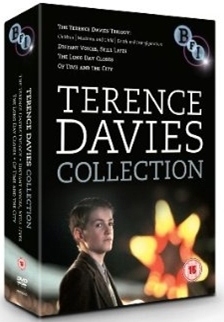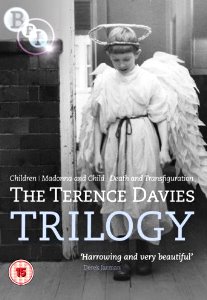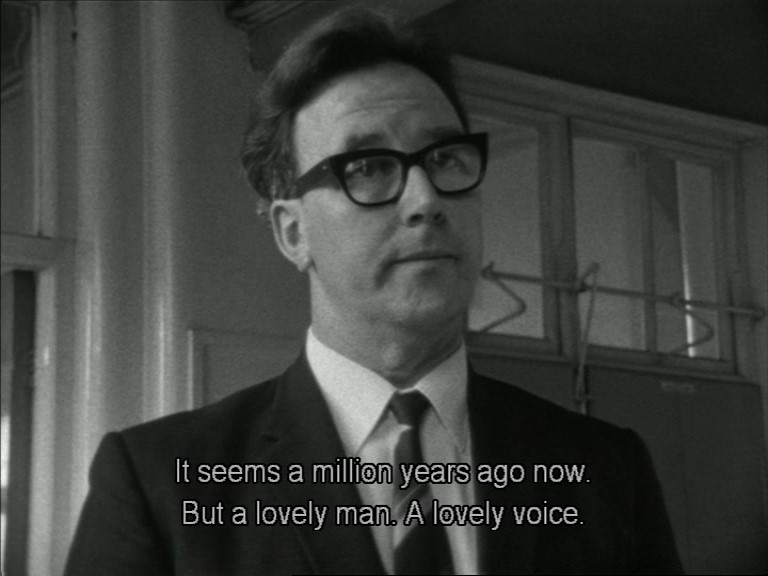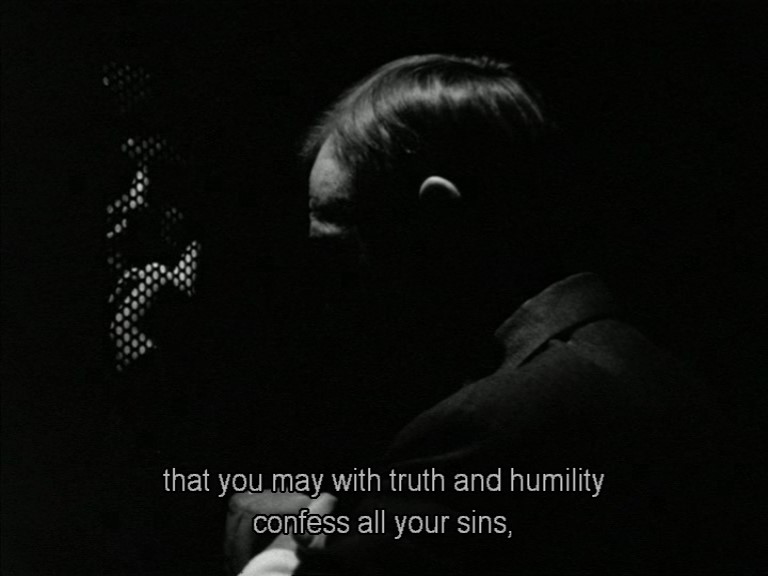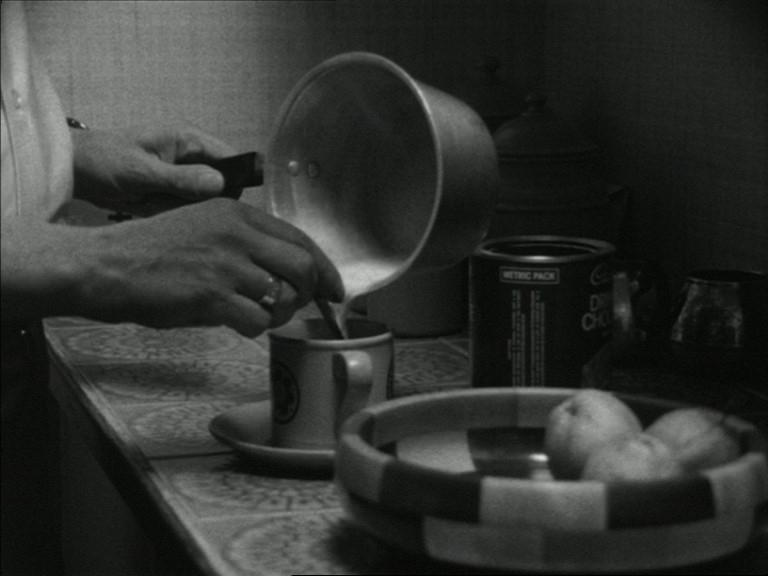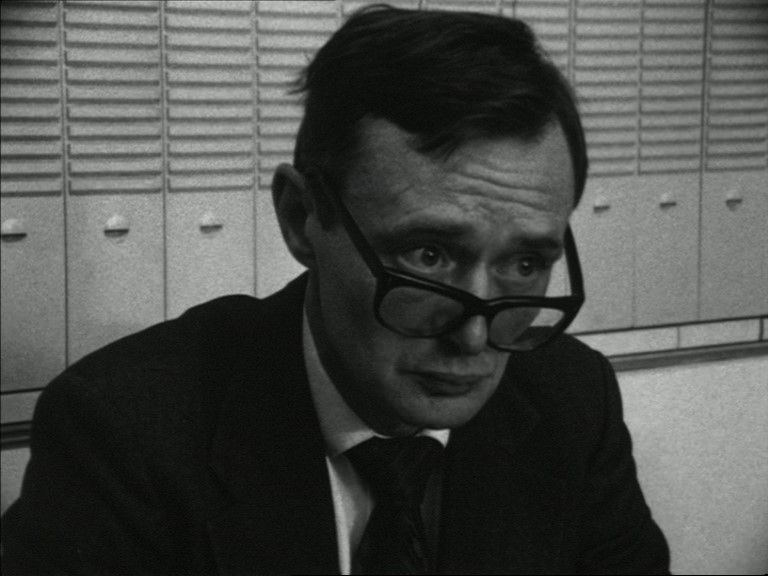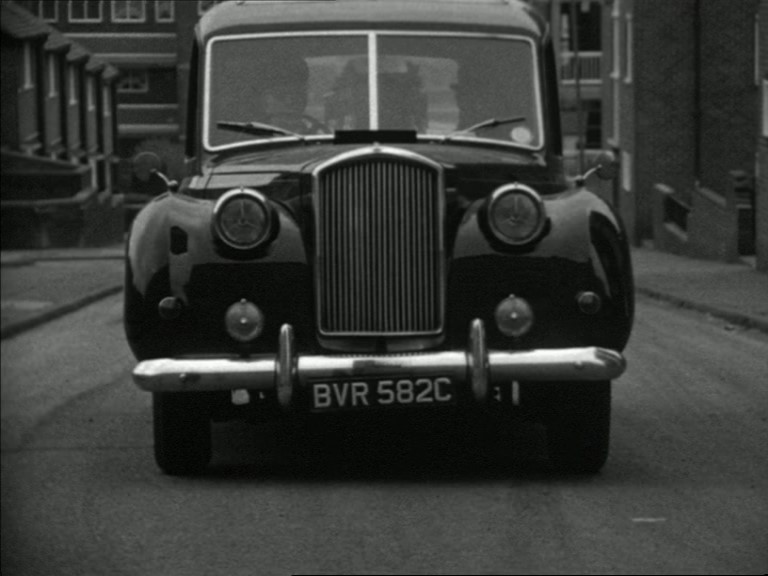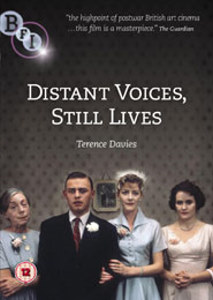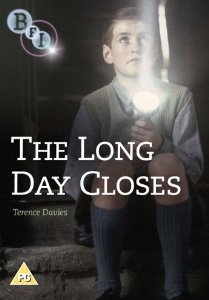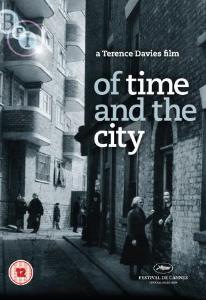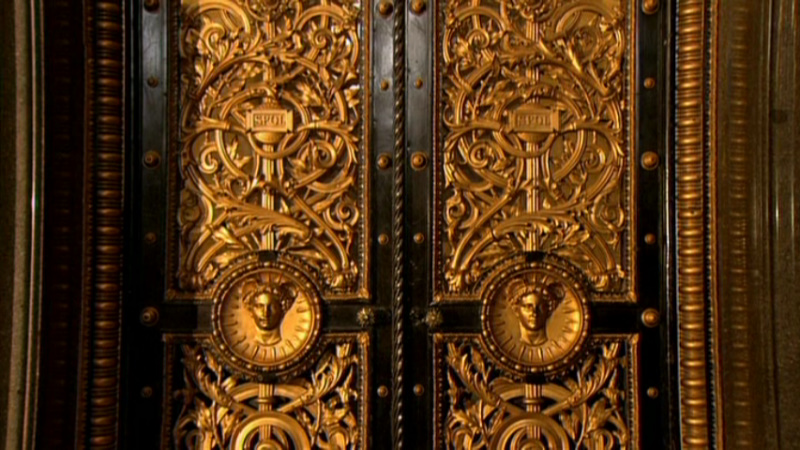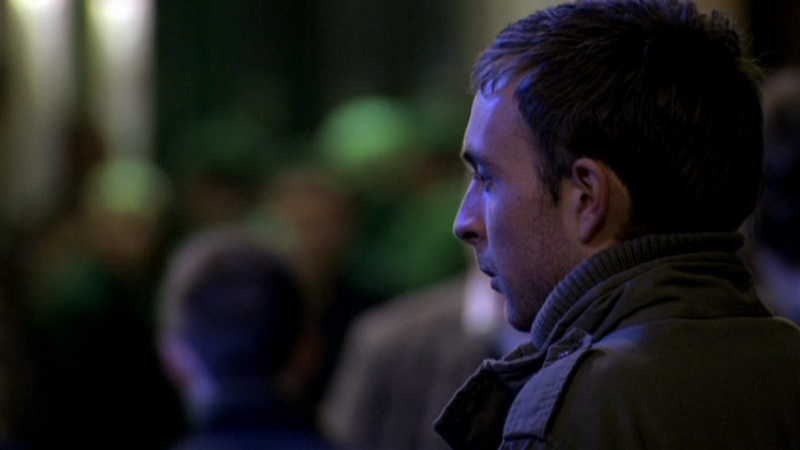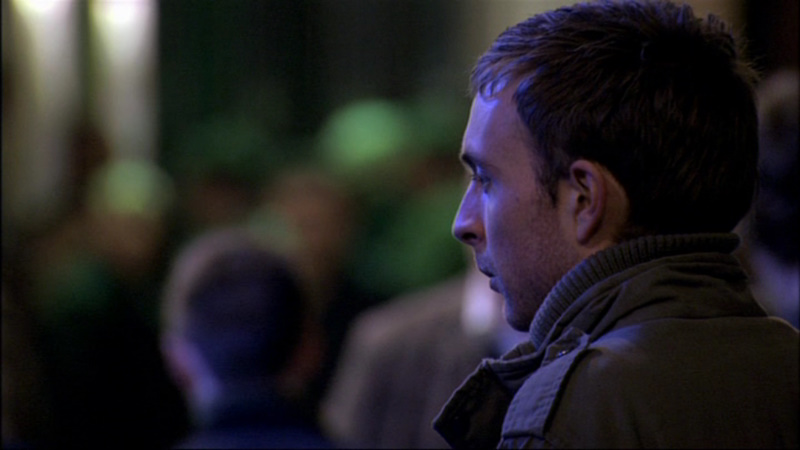![]()
![]()

![]()
![]()
|
Search DVDBeaver |
S E A R C H D V D B e a v e r |
The Terence Davies Collection
| British director and screenwriter Terence Davies is noted for his highly personal and often autobiographical chronicles of British working class and the struggles they face in the post-WWII world. He first gained recognition for his TERENCE DAVIES TRILOGY (1976-1983), which is comprised of three black-and-white religious-themed short chronicles of daily life. The TRILOGY is included in this collection, along with Davies' later works DISTANT VOICES STILL LIVES (1988), THE LONG DAY CLOSES (1992), and OF TIME AND CITY (2008). |
|
As Michael Brooke confirms in the Criterion Forum:
The four discs (as
far as I can see, straightforward repressings of the
individual releases, complete with extras) are in
their own slimline Amaray slipcases with a chapter
listing on the inside of each box, and there's a
single 28-page booklet containing: (Thanks Michael!) We have reproduced our original reviews, and one comparison below. |
| Production Description: Terence Davies Collection Considered by many to be Britain's most gifted and remarkable filmmaker, Terence Davies' visually stunning, intensely personal films have impressed audiences the world over and seen him proclaimed by critics as one of contemporary cinema's true poets. Collected together for the first time in one DVD set, along with extra features and a booklet of essays, are The Terence Davies Trilogy (1976-1983), Distant Voices, Still Lives (1988), The Long Day Closes (1992) and Of Time and the City (2008). The Terence Davies Trilogy These three semi-autobiographical short films follow the journey of Robert Tucker, first seen as a hangdog child in Children, then as a hollow-eyed middle-aged man in Madonna and Child, and finally as a decrepit old man in Death and Transfiguration. Dreamlike and profoundly moving. • Feature commentary by Terence Davies; • Filmed interview with Terence Davies. UK / 1976-1983 / b&w / English, optional hard-of-hearing subtitles / 94 mins / DVD-9 / Original aspect ratio 1.33:1. Distant Voices, Still Lives An impressionistic view of working-class life in 1940s and 1950s Liverpool that stars Freda Dowie and Pete Postlethwaite. Through a series of exquisite tableaux Davies creates a deeply affecting photo album of a troubled family wrestling with the complexity of love. • Feature commentary by director Terence Davies; • Filmed interview with Terence Davies; • Filmed introduction with Art Director Miki van Zwanenberg; • Original trailer. UK / 1988 / col / English, optional hard-of-hearing subtitles / 80 mins / DVD-9 / Aspect ratio 1.78:1 (16 x 9 anamorphic). The Long Day Closes Bud's home is happy and safe, but his Catholic school is a harsh world where teachers administer lashings, and he is bullied and friendless. Once again Davies creates a dreamlike montage of memories, using gliding tracking shots and an artful layering of pop songs and religious music. • Feature commentary with Terence Davies and Director of Photography Mick Coulter; • On-set interview with production designer Christopher Hobbs; • Previously unseen behind-the-scenes footage of Terence Davies directing. UK / 1992 / col / English, optional hard-of-hearing subtitles / 85 mins / DVD-9 / Aspect ratio 1.85:1. Of Time and the City Davies revisits the city of his youth in this deeply personal BAFTA-nominated evocation of post-World War II Liverpool. Through the film's patchwork visual poetry, woven entirely from painstakingly researched archival footage, Davies explores an urban landscape that echoes his own troubled past to speak candidly of his childhood experiences. • The making of Of Time and the City (2009) – in new interviews, Terence Davies and the film’s producers and archive producer discuss the making of the film and the inspirations behind it • Listen to Britain (Humphrey Jennings, Stuart McAllister, 1942) the classic wartime documentary which helped inspire Of Time and the City, presented with a personal introduction by Terence Davies • Q&A with Terence Davies at Cambridge Arts Picturehouse • Original trailer UK / 2008 / col, and b&w / English, optional hard-of-hearing subtitles / 74 mins / DVD-9 / Aspect ratio 1.77: 1 (16 x 9 anamorphic widescreen). |
The Terence Davies Trilogy
Children (1976) Madonna and Child (1980) Death and Transfiguration (1983)
Titles
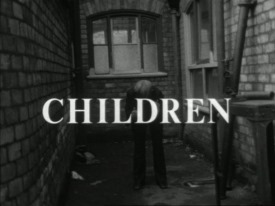 |
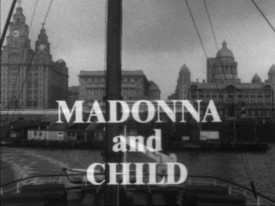 |
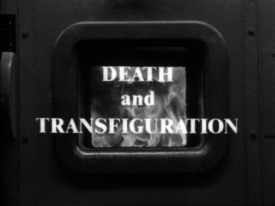 |
|
Restored by the BFI National Archive and released on
DVD for the first time; with commentary by Terence
Davies |
Theatrical Releases: Various from 1976 - 1983
DVD Review: BFI - Region 2 - PAL
| DVD Box Cover |
|
Individually: In Terence Davies Collection Boxset: |
| Distribution | BFI - Region 2 - PAL | |
| Time: | 44:26, 27:04, 24:50 | |
| Bitrate: |
 |
|
| Audio | English (2.0) | |
| Subtitles | English, None - Optional subtitles for the hearing impaired on the feature film and commentary tracks! | |
| Features |
Release Information: Studio: BFI Aspect Ratio: All Original Aspect Ratios - 1.33 Edition Details:
• Full
feature commentary by Terence Davies for all three films
|
|
| Comments: |
Each have original English audio with an option for English subtitles in a white font with black border (see samples below). The extras, including the commentaries, also in English, also have optional subtitles. Image: All three are transferred in their original 1.33 aspect ratio. Perhaps suffering their more meager production roots the image quality is certainly less than perfect. Contrast can be a bit muddy with a sepia/greenish cast on the black and white images taking away somewhat from their purity. Detail is mediocre but consistent throughout all three features. There is a bit of noises but it is fairly fine. Overall, I wasn't displeased but fans should, obviously not expect a modern quality presentation. The screen captures below should give you a good idea. Audio - All have 2.0 channel audio that sounds flat and unremarkable - this would be akin to original. It's clean and clear enough but shows signs of its simple roots and the optional subtitles are appreciated (samples below) especially for those unfamiliar with the occasionally strong accents. Extras include more full commentaries, on all three, by Terence Davies and he is as eloquent and interesting as in the others I've encountered. A real pleasure to hear this man talk of his craft. There are also filmed interviews with Davies by Geoff Andrew and a 10-page liner notes illustrated booklet including essays by Derek Jarman and Distant Voices, Still Lives producer Jennifer Howarth on Terence Davies at Film School. Overall impression: I was still reeling from The Long Day Closes and probably should have waited a week or so to view these but I was anxious and although not at the same level of impact as the latter work - you can still see the evolution of his cinematic eye in so many scenes. Davies really is a master and I consider him one of my absolute favorite living directors. This, Predictably has a very dour and dark edge but viewers willing to accept that receive a strong recommendation from us. |
DVD Menus
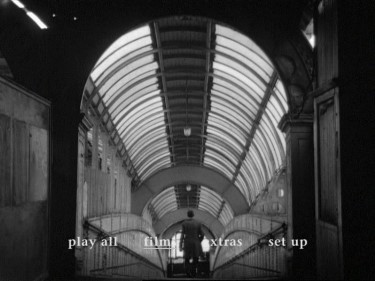 |
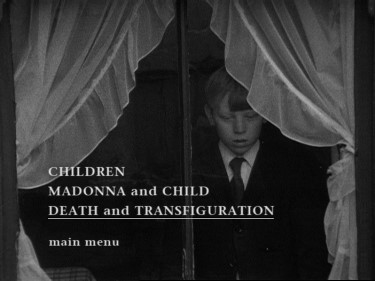 |
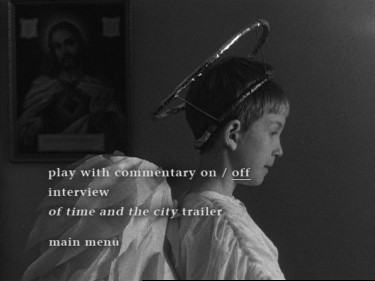 |
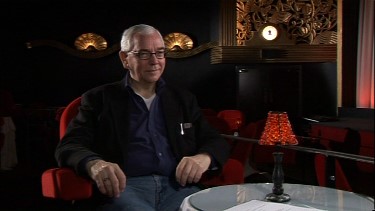 |
Children (1976)
Screen Captures
Top captures is an example of the Director commentary subtitles!
|
|
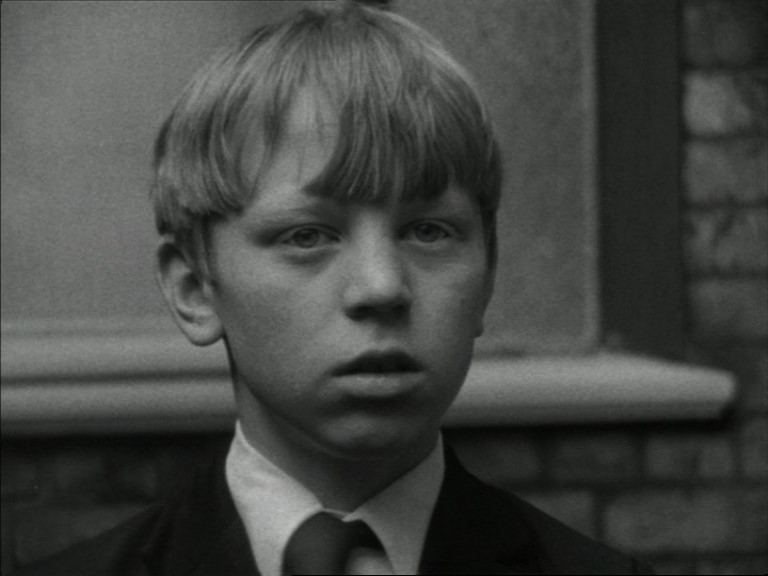 |
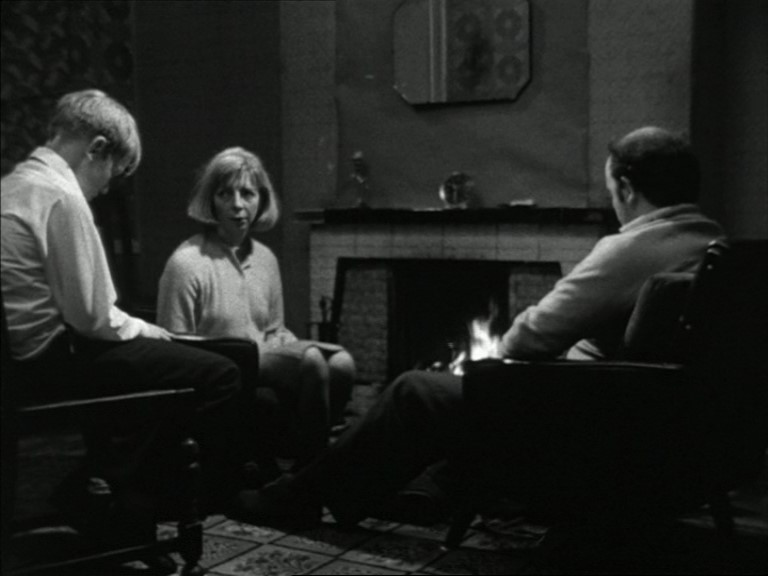 |
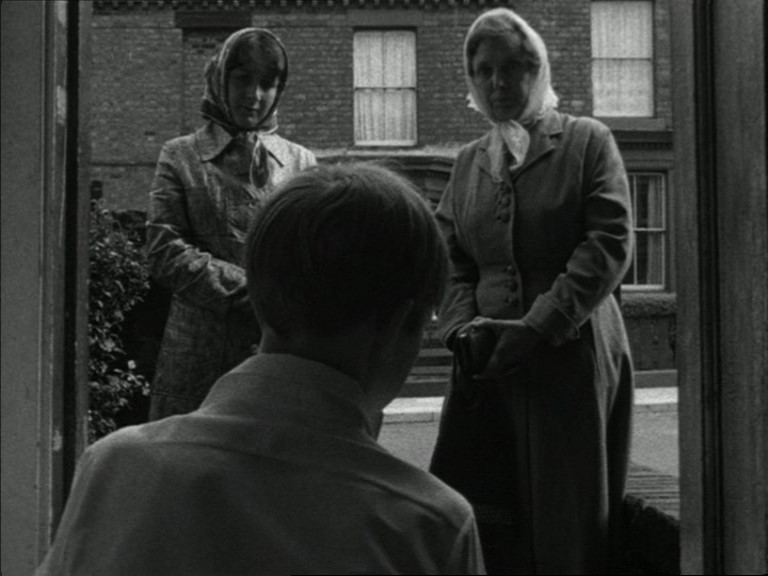 |
Madonna and Child (1980)
Screen Captures
|
|
|
|
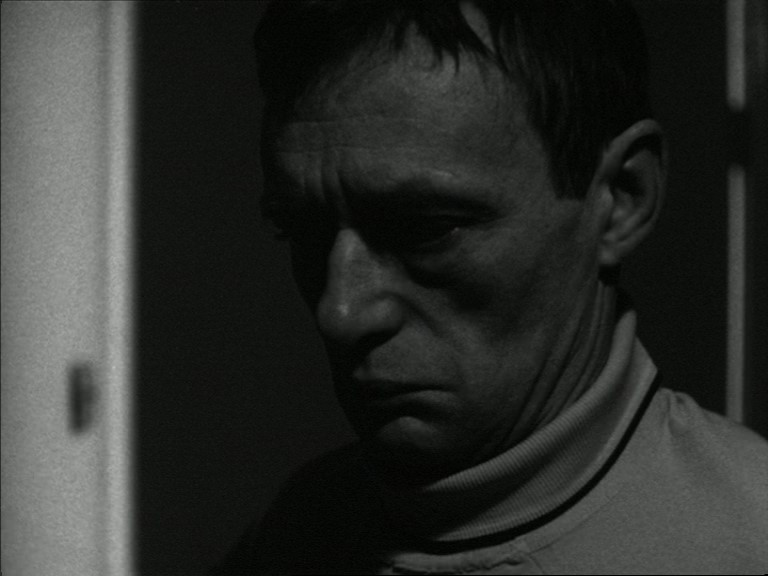 |
|
|
Death and Transfiguration (1983)
Screen Captures
|
|
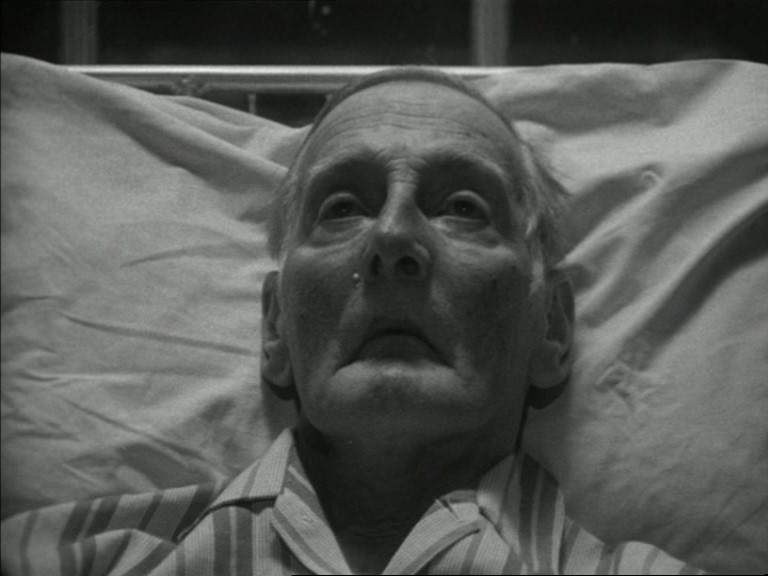 |
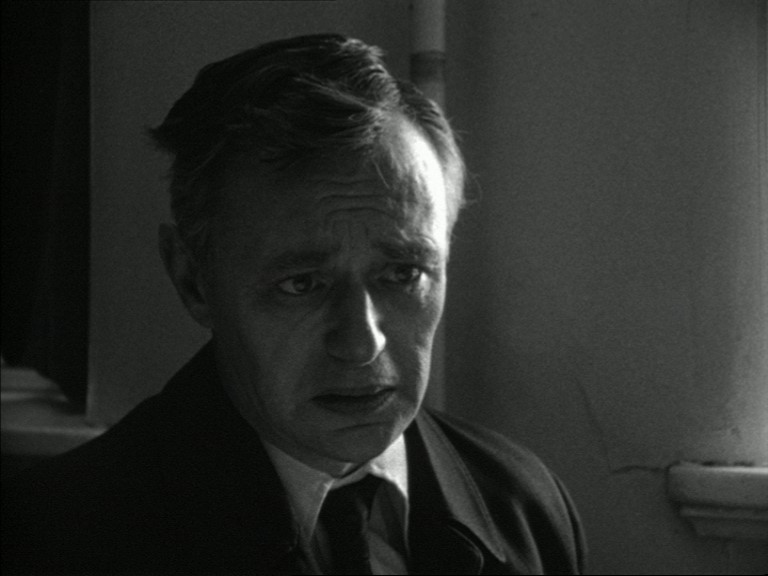 |
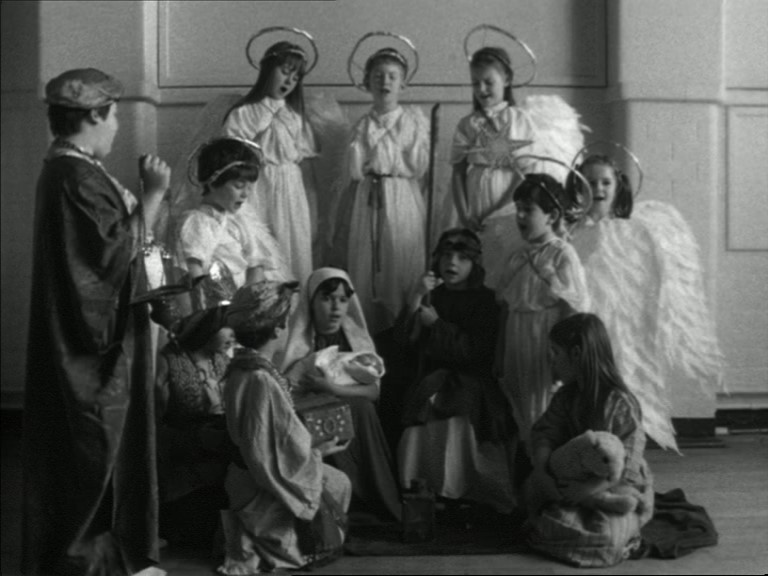 |
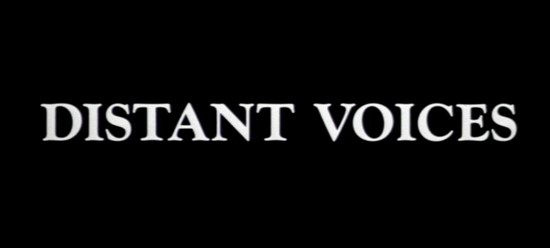
(aka 'Distant Voices, Still Lives')
Directed by Terence Davies
UK 1988
|
Terence Davies's stunning debut feature film
Distant Voices, Still Lives was instantly
recognised as a masterpiece on its release in 1988
and the director hailed as one of Britain's most
gifted and remarkable filmmakers. Re-released in
April 2007 as part of a complete retrospective
season of Terence Davies's films at BFI Southbank,
it was once again showered with critical acclaim. ****
Superlatives are in
short supply to describe the emotional power of
Terence Davies’ fractured chronicle of the life of a
working-class family in 1940s and ’50s Liverpool.
Drawing on his own childhood, Davies turns his film
on the pivot of a brutal patriarch’s death and his
daughter’s subsequent marriage, so splitting his
film into two episodes (which he filmed a year
apart). The first, ‘Distant Voices’, is a set of
difficult memories of childhood fear and wartime
suffering that drift in and out of the wedding day,
while its companion, ‘Still Lives’, portrays the
life of a happier widow, her two daughters, a son
and their friends who gather in pubs, sing and are
beginning to suffer their own marriages. Pete
Postlethwaite is Tommy Davies, the violent, damaged
and taciturn father; Freda Dowie is Mrs Davies, his
stoic wife and the suffering lynchpin of the family;
and Angela Walsh is Eileen, the daughter whose
marriage blows a gust of fresh air into the stale
misery of her family but also threatens to follow
the same tragic pattern as her parents. |
Poster
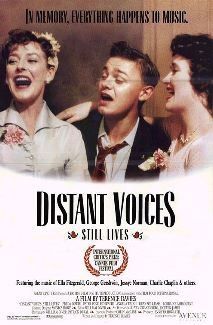 |
Theatrical Release: September 11th, 19988 - Toronto Film Festival
Reviews More Reviews DVD Reviews
DVD Review: BFI - Region 2 - PAL
| DVD Box Cover |
|
Individually: In Terence Davies Collection Boxset:
|
| Distribution | BFI Video - Region 2 - PAL | |
| Runtime | 1:20:30 | |
| Video |
1.78:1 Aspect Ratio Average Bitrate: 5.69 mb/s PAL 720x576 25.00 f/s |
|
|
NOTE: The Vertical axis represents the bits transferred per second. The Horizontal is the time in minutes. |
||
| Bitrate: |
|
|
| Audio | English (Dolby Digital 2.0) | |
| Subtitles | English, None | |
| Features |
Release Information: Studio: BFI Video Aspect Ratio: Original Aspect Ratio 1.78:1
Edition Details:
• Feature commentary by
director Terence Davies |
|
| Comments: |
Yet another fabulous DVD package from BFI. Such an impressive, and at times understated, film that it's hard imagining it not touching everyone to some degree. The film's image is often intentionally styled to produce effects - age or photographic moments (sepia tinted or heavily grained) but the quality looks as true to theatrical as one could imagine. The transfer looks un-manipulated and there are no visible damage marks. Audio was clean and clear and it is support by optional English subtitles. BFI have put some love in to this with many strong, relevant, extras. First a director commentary from Davis. He has a wonderfully soft-spoken accent and imparts production details that only the director would be aware of. There is also a 20 minute video interview with Davis by Geoff Andrew and a six minute intro from the Art Director Miki van Zwanenberg. BFI include the original trailer but I also got a lot out of the liner notes booklet with essays by Beryl Bainbridge (entitled Bittersweet Symphony) and Adrian Danks (The Art of Memory), plus an original review from the Monthly Film Bulletin and a Davis biography. In conclusion I'd say this is just about a perfect DVD package. Although I had heard of the film I had never had the privilege of seeing it. Magnificent... and BFI continue to impress as a company that cares by bring it to us with extensive effort, care and diligence on their part. Bravo! I strongly suggest owning this DVD. Very strongly. |
DVD Menus
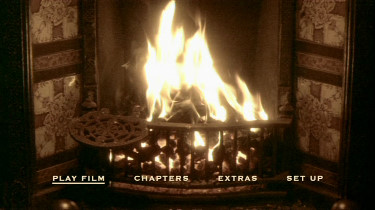 |
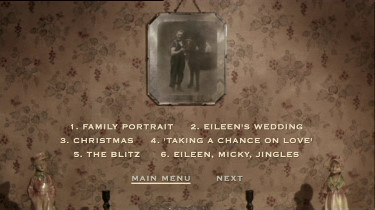 |
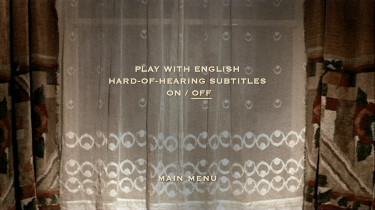 |
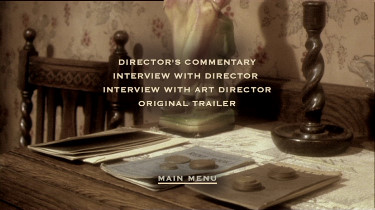 |
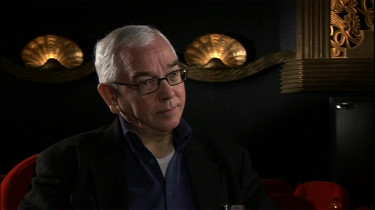 |
 |
Subtitle Sample
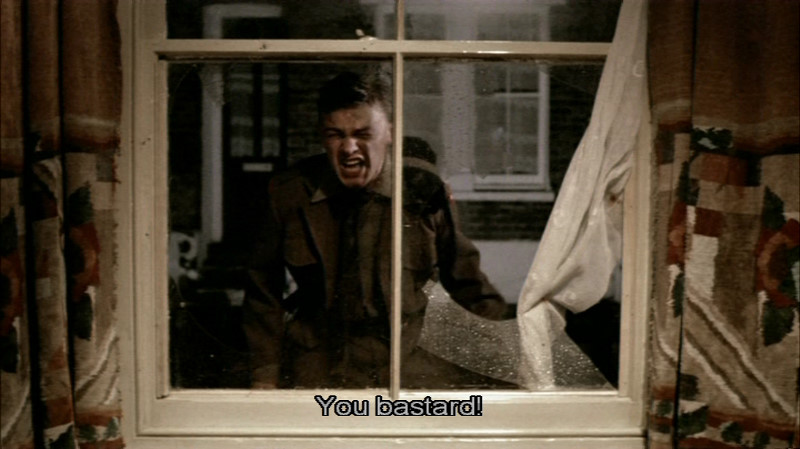 |
Screen Captures
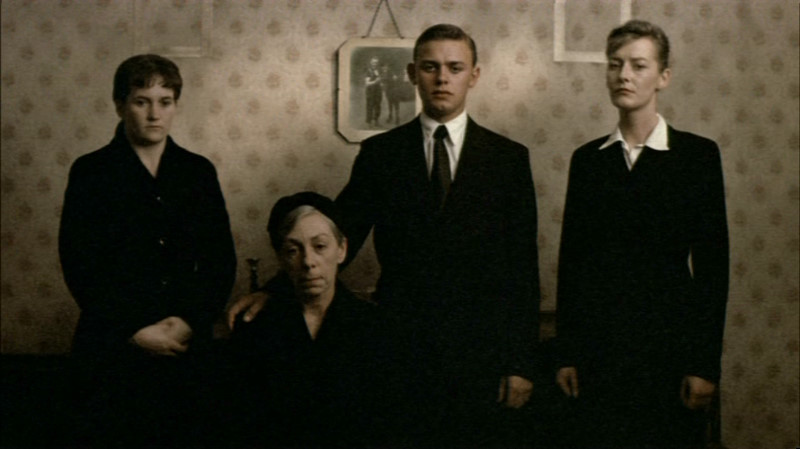 |
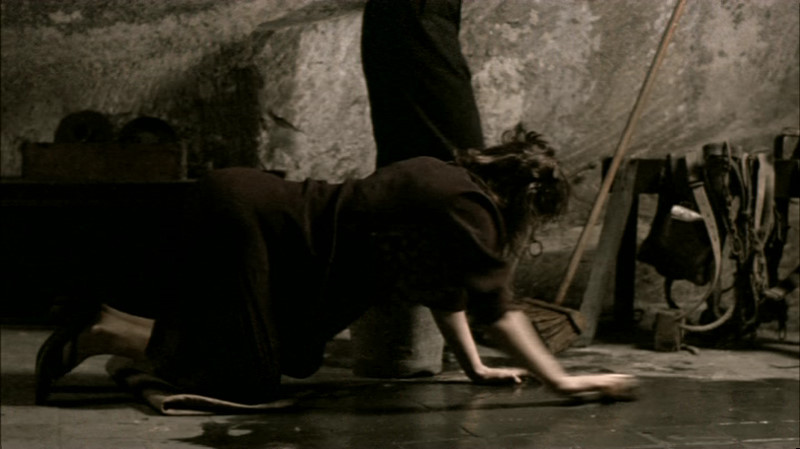 |
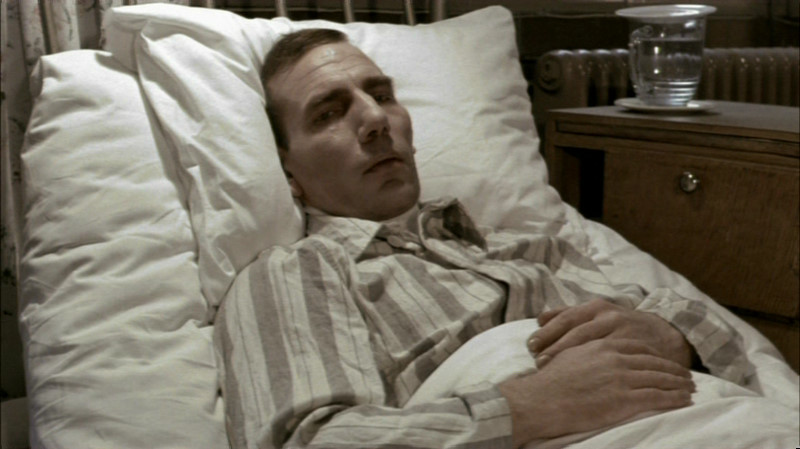 |
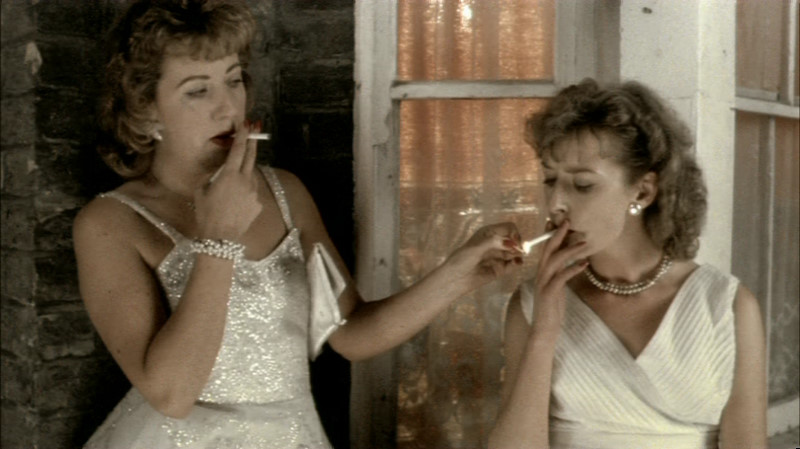 |
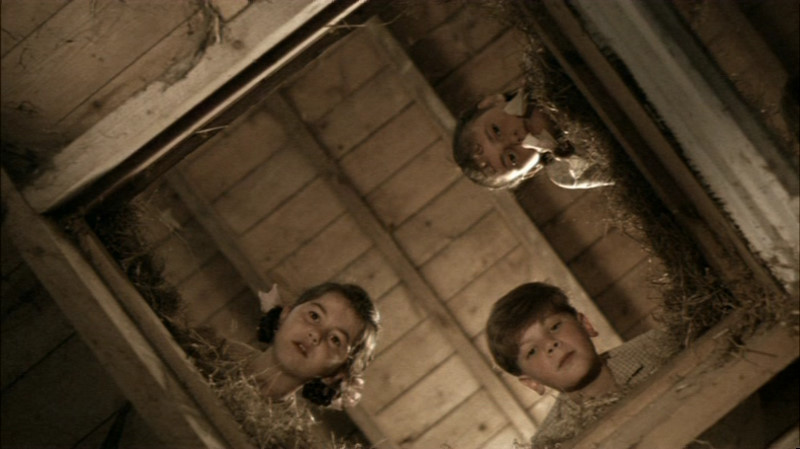 |
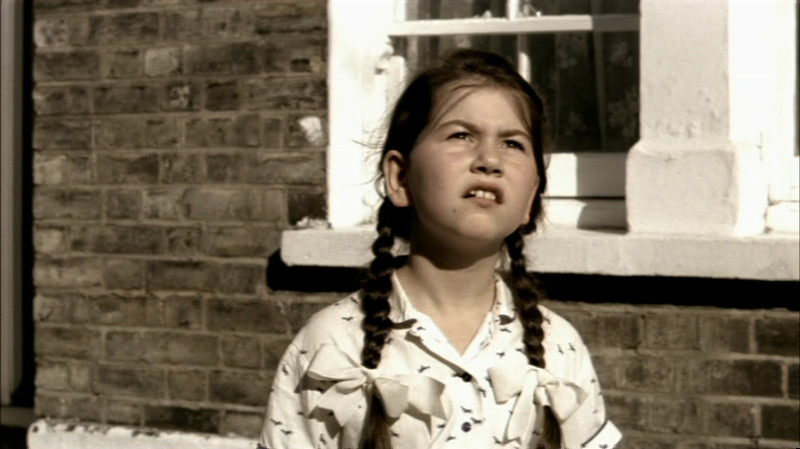 |
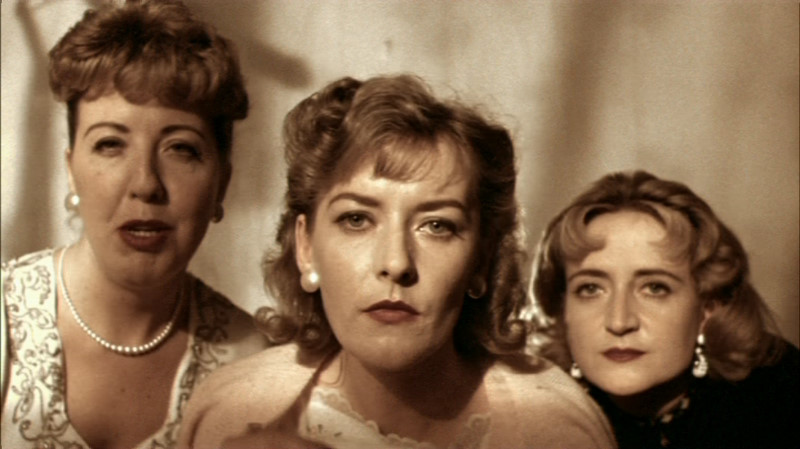 |
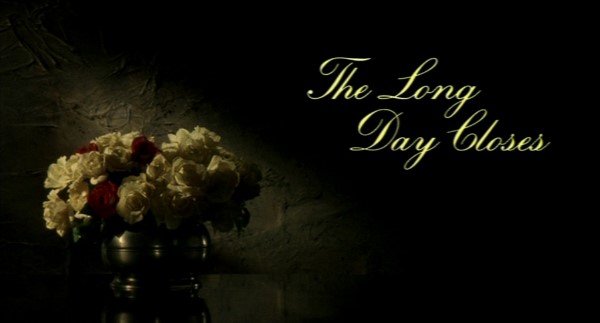
Directed by Terence Davies
UK 1992
|
Following his prize-winning debut feature film
Distant Voices, Still Lives (1988), in 1992
Terence Davies made The Long Day Closes, now
released by the BFI on DVD for the first time, alongside
The Terence Davies Trilogy. |
Poster available at UKQuad.com located HERE
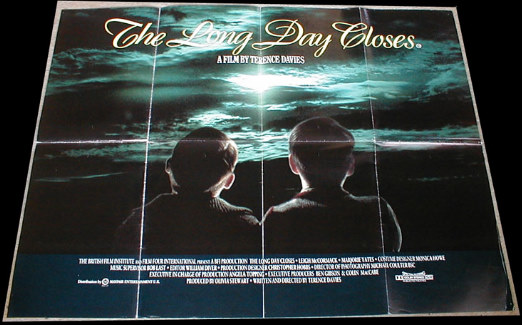 |
Theatrical Release: May 22nd, 1992
Reviews More Reviews DVD Reviews
DVD Review: BFI - Region 2 - PAL
| DVD Box Cover |
|
Individually: In Terence Davies Collection Boxset: |
| Distribution | BFI Video - Region 2 - PAL | |
| Runtime | 1:21:45 | |
| Video |
1.85:1 Aspect Ratio Average Bitrate: 5.29 mb/s PAL 720x576 25.00 f/s |
|
| Audio | English (2.0 - uncompressed PCM stereo audio) | |
| Subtitles | English, None NOTE: Optional subtitles for the hearing impaired on the feature film and commentary tracks! | |
| Features |
Release Information: Studio: BFI Aspect Ratio: Original Aspect Ratio 1.85:1
Edition Details:
• Full feature commentary with
Terence Davies and Director of Photography Mick Coulter
Trailer for Of Time and the City
(2:13) |
|
| Comments: |
To my knowledge this classic is released on DVD for the first time. It looks perhaps a notch above BFI's Distant Voices, Still Lives as far as image quality goes and has the same 'look'. It has some noise and the film has many dark scenes. Detail is rather mediocre at times but has a very consistent feel - a bit heavy but the images are so wonderful. The transfer has no visible damage marks. It's dual-layered and anamorphic. The uncompressed PCM audio sounded quite pure with clean and clear dialogue - supported by optional English subtitles (for the commentary too). NOTE: "Both (The Long Day Closes and Distant Voices, Still Lives) films underwent a bleach-bypass process to attain Davies' preferred period look for each film (although DVSL uses this process somewhat more heavily). This procedure usually occurs near the end of the lab while making prints, but for the new HD transfer Davies and Coulter worked hard to achieve this look at the telecine stage. Whatever occasional minor loss of detail or saturation is compensated by delivering what is Davies' and Coulter's true and definitive vision of their film." The supplements are fabulous - another adept, soft-spoken commentary from Terence Davies - this time with director of photography Mick Coulter. Accents (Coulter's Scottish - <my guess> - brogue) are on the thick side so the optional commentary subtitles are very much appreciated (sample below). It's a fun commentary with lots of socializing and recollections although plenty of good information is imparted as well. There is also a short, 3 minute, on-set interview with production designer Christopher Hobbs and some previously unseen behind-the-scenes footage of Terence Davies directing - essentially one specific scene from the film - lasting just over 8 minutes. We are treated to a trailer for Of Time and the City and an 18-page illustrated booklet with essays, director biography and credits. NOTE: Looking at the VoB files I see perhaps there is more than I have mentioned, beyond accessibility from the menus, as far as supplements go - but I'll investigate further and contact BFI to see if I'm mistaken. I'll report here if I find anything additional. I was very pleased with what I was able to access. Bottom line: Immensely poignant - magnificent - must see cinema - possibly our DVD of the Month. Strongly recommended! |
DVD Menus
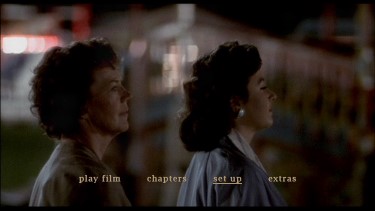 |
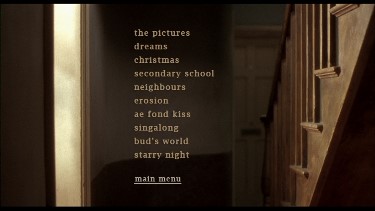 |
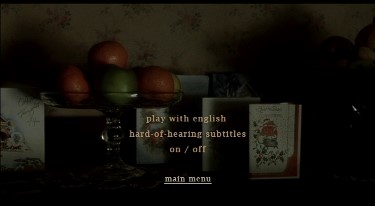 |
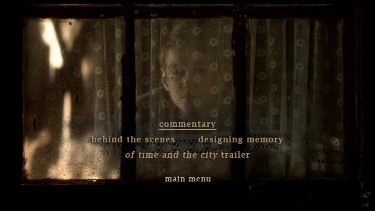 |
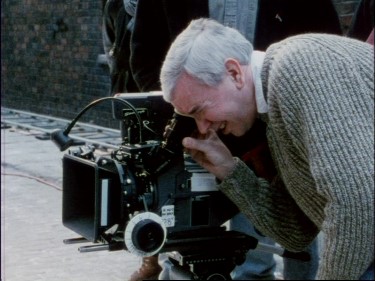 |
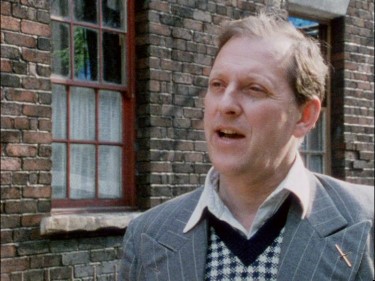 |
Subtitle Sample
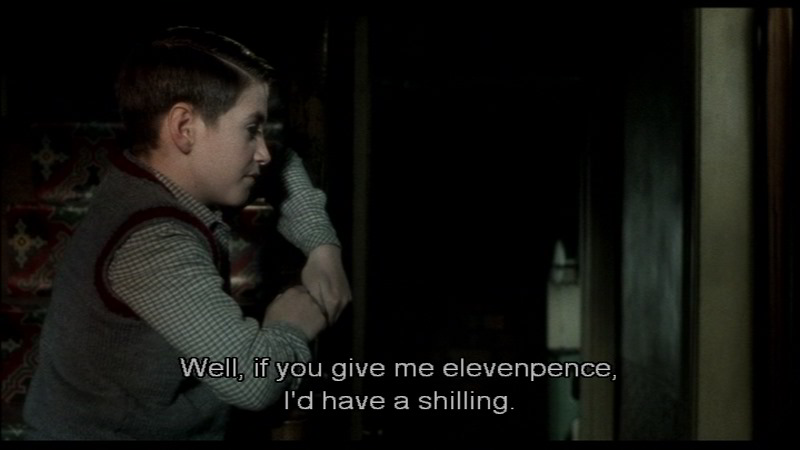 |
Sample of Commentary subtitles
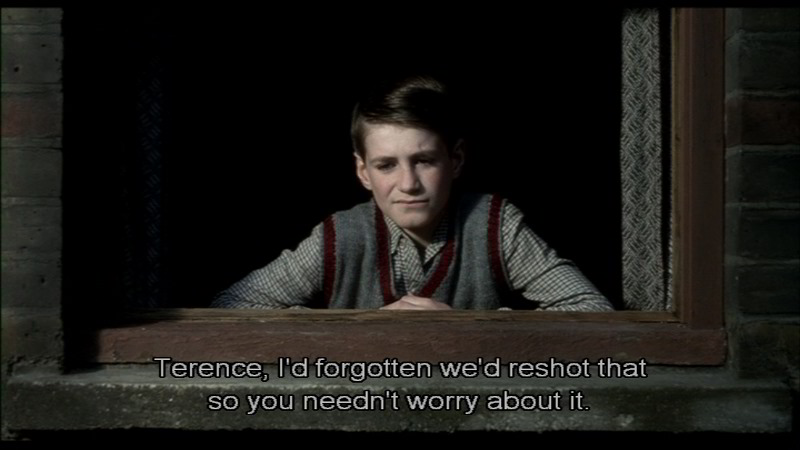 |
Screen Captures
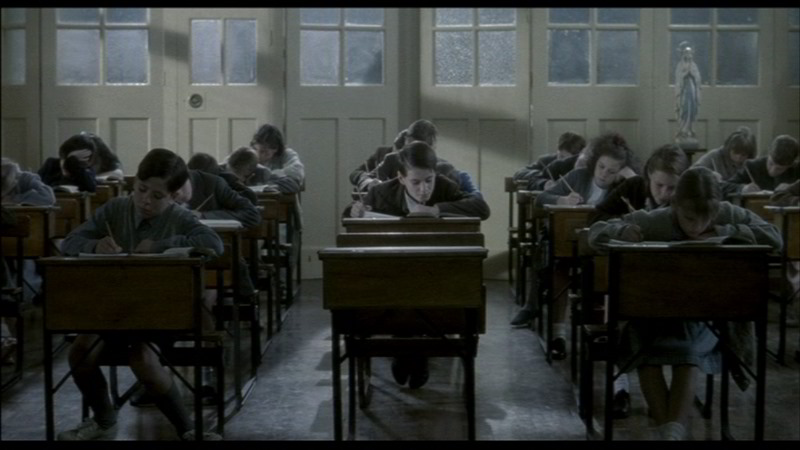 |
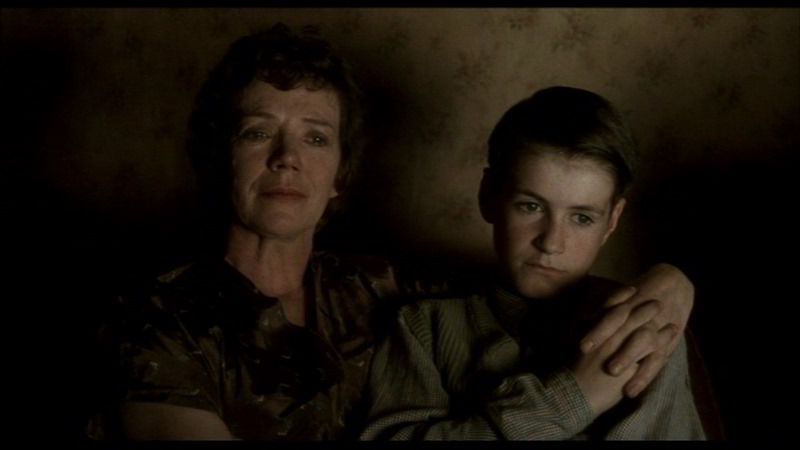 |
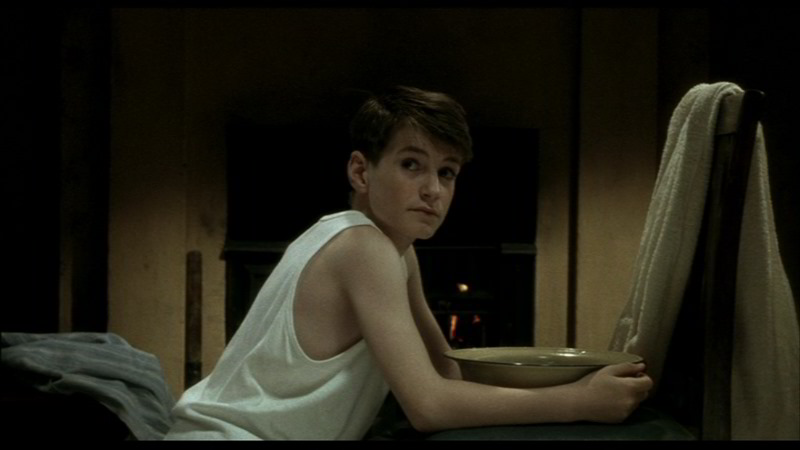 |
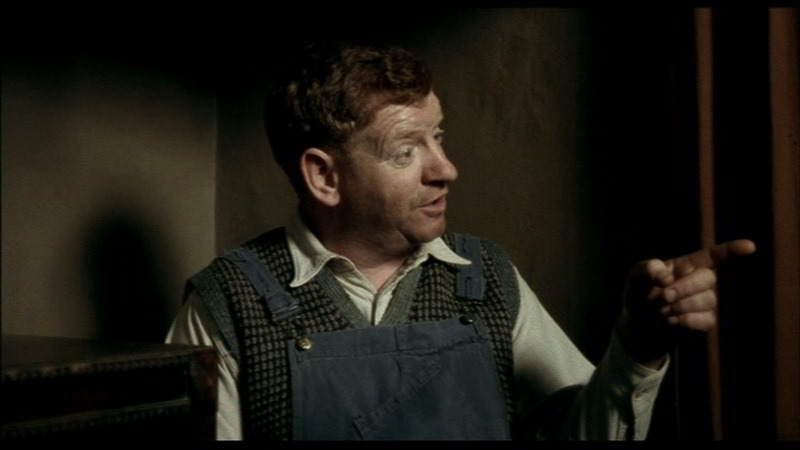 |
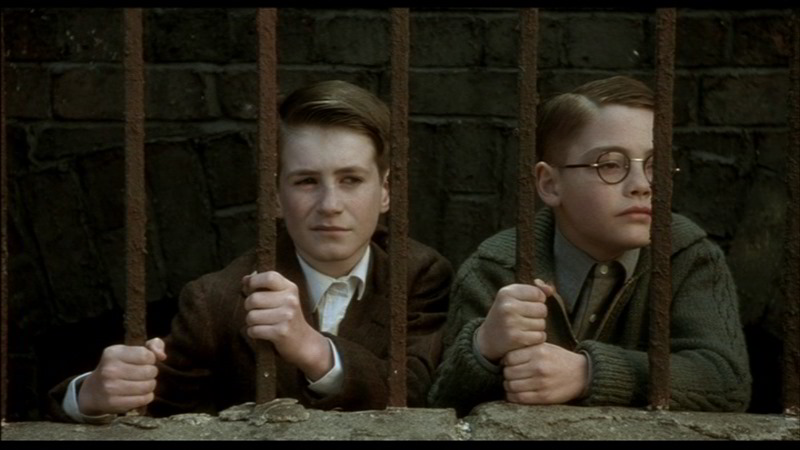 |
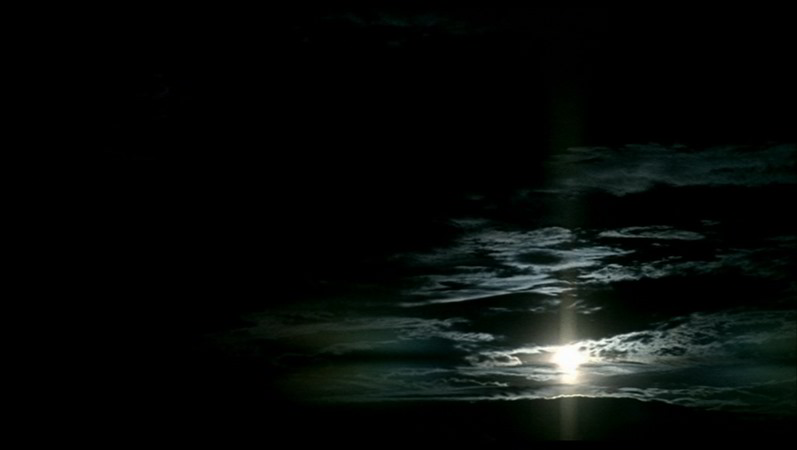 |
directed by Terence Davies
UK
2008
|
Terence Davies' ode to his native Liverpool has wowed audiences and critics alike after being hailed as the highlight of the Cannes Film Festival where it received its premiere. This is a spectacular return to form by Davies, long-hailed as one of Britain's greatest filmmakers. Of Time and the City is an illuminating and heartfelt work, powerfully evoking life in post-war Britain while exploring the nature of love, memory, and the toll that the passing years takes on the cities and communities that we cherish. This is no simple documentary; it is an entrancing piece of autobiographical cinema that reaches far beyond the city in which it is set, weaving a rich tapestry from archive and contemporary footage, music, voice, literary quotation, personal reminiscence and wickedly funny observation. ***
"Of Time and the City" is a difficult film to
describe but a distinct pleasure to experience. A cinematic
essay, a documentary and a memory piece, all at the same
time, it is more than anything an unapologetically poetic
film that allows British director Terence Davies to ruminate
on Liverpool, the city of his birth, and his own life and
times there. |
Poster
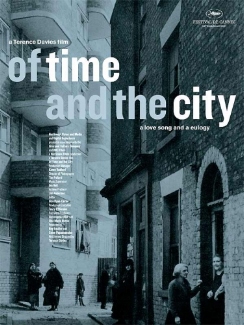 |
Theatrical Release: May 20th, 2008 - Cannes Film Festival
Reviews More Reviews DVD Reviews
DVD Comparison:
Strand - Region 0 - NTSC vs. BFI - Region 2 - PAL
(Strand - Region 0 - NTSC LEFT vs. BFI - Region 2 - PAL RIGHT)
| DVD Box Cover |
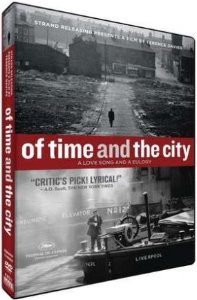 |
|
|
Individually: In Terence Davies Collection Boxset: |
||
| Distribution | Strand Releasing - Region 0 - NTSC | BFI - Region 2 - PAL |
| Runtime | 1:13:54 | 1:13:45 |
| Video |
1.78:1 Aspect Ratio Average Bitrate: 7.85 mb/s NTSC 720x480 29.97 f/s |
1.78:1 Aspect Ratio Average Bitrate: 6.64 mb/s PAL 720x576 25.00 f/s |
|
NOTE: The Vertical axis represents the bits transferred per second. The Horizontal is the time in minutes. |
||
| Bitrate: Strand DVD |
|
|
| Bitrate: BFI DVD |
|
|
| Audio | English (Dolby Digital 2.0 Mono) | English (Dolby Digital 2.0) |
| Subtitles | None | English (Hearing Impaired), None |
| Features |
Release Information: Studio: Strand Aspect Ratio: 1.78:1
Edition Details: • Trailer (2:21) • Interviews (Terence Davies, Producers Roy Boulter and Sol Papadopoulos, Executive producer Lisa Marie Russo and Editor Liza Ryan-Carter) - 24:13 • On the Set with Terence Davies (4:27) • In the Editing Room With Terence Davies (2:43) • Highlights (4:45)
• Trailers
from other Strand Releases |
Release Information: Studio: BFI Aspect Ratio: 1.78:1
Edition Details:
• The making of Of Time and the
City (2009): in new interviews, Terence Davies and the
film's producers and archive producer discuss the making of
the film and the inspirations behind it(45:40). |
| Comments: |
Speaking bluntly - here we have a production company that frequently does things 'correctly' and another who almost exclusively 'screws things up'. Let's start with the positive - the BFI Region 2 - PAL DVD is dual-layered, progressive and represents the film's extensive archival footage to the highest ideal for the SD-DVD format. Onto the bad; it seems every time we review a Strand Releasing title - it is taken from an unconverted PAL source and thrown on an NTSC standard DVD . Hence it has all the deficiencies of that lesser transfer practice. They remain consistent here but not only is there frequent ghosting and combing in the Strand image (by the way, making it very frustrating to match captures with the superior BFI edition) but contrast is much weaker as well looking to have infiltration of green/blue (although both have been reportedly derived from the same telecine). The fact that the BFI is minutely sharper is really not the issue - how it looks in motion is world's apart. I don't mean to attack Strand all the time as there is a viable argument for at least exposing this film to a North American, region-locked, audience. Also though, on the visual front - the BFI show a tad more information in the 1.78 frame and has less noise/artifacts (is smoother). So while the static images below don't tell the whole story this time - you can take my word for it that the BFI is vastly superior. I can't honestly say I noted a difference in the audio but I should state that I LOVE the solo piano accompaniment and other dramatic music used in the documentary. It is only in 2.0 channel for both but works wonders with a presentation. The BFI have thought to include optional English subtitles for the narration - where Strand have none. Looking beyond the surface listing of each disc's supplements - they are again heavily in the BFI's favor. Strand have an extras section simply called Interviews which strings together 4 poor quality shot pieces with Terence Davies, a second with Producers Roy Boulter and Sol Papadopoulos, a third with Executive producer Lisa Marie Russo and end with Editor Liza Ryan-Carter. It lasts about 25 minutes and while the information has merit - it seems again simply thrown on the disc. Ditto for the other extras - On the Set with Terence Davies runs less than 5 minutes and has no probative value. A bit more interesting is In the Editing Room With Terence Davies but it runs less than 3-minutes. Highlights (4:45) could be outtakes or some of the more preferred shots from the film and there is a trailer (2:21) and trailers from other Strand Releases. It all seems 'puffed up' without much viable content. BFI supply a detailed 'The Making of Of Time and the City' with new interviews. Terence Davies and the film's producers and archive producer discuss the making of the film and the inspirations behind it and it runs over 45 minutes. BFI have included Listen to Britain - 19:09 (Humphrey Jennings, Stuart McAllister,1942): the classic wartime documentary which helped inspire Of Time and the City, presented with a personal introduction by Terence Davies running just over a minute. There is also a 20-minute Q&A with Terence Davies at Cambridge Arts Picturehouse and an original theatrical trailer. A wonderful touch is the included 22-page Illustrated booklet featuring essays, credits and a biography. Finally, let's look at price - the Strand is $22.49 USD and the BFI is £12.98 = $19.66 USD - almost $3 cheaper. I am enamored with Terence Davies cinema and while I'm not as keen on documentary work - I am so glad to have seen this as it reflects on his other work very well. This should be seen - and we roundly choose the BFI - for the best viewing experience and valuable extra features. |
DVD Menus
(Strand - Region 0 - NTSC LEFT vs. BFI - Region 2 - PAL RIGHT)
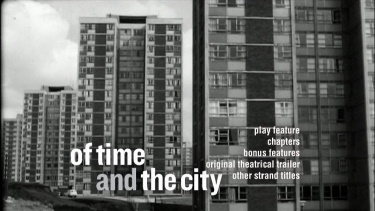 |
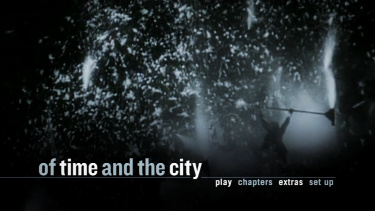 |
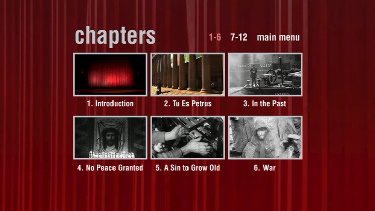 |
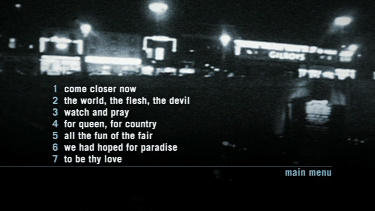 |
 |
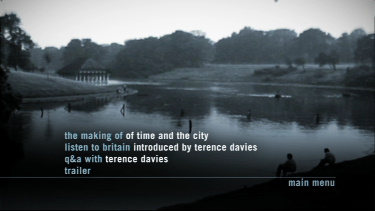 |
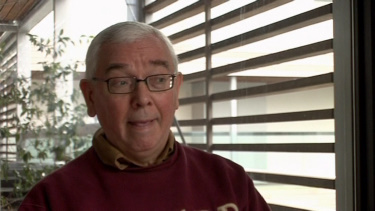 |
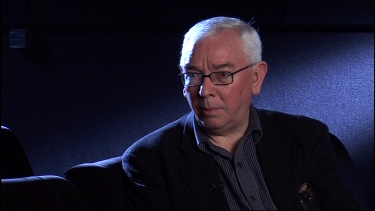 |
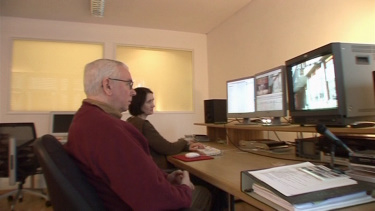 |
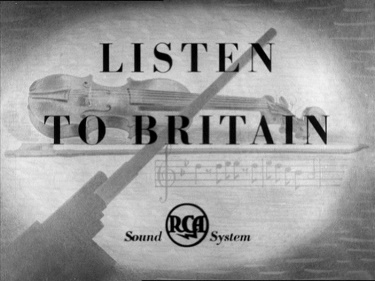 |
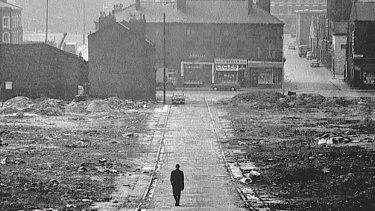 |
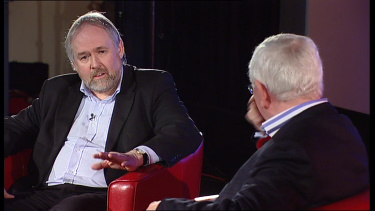 |
Subtitle Sample
(Strand - Region 0 - NTSC TOP vs. BFI - Region 2 - PAL BOTTOM)
|
|
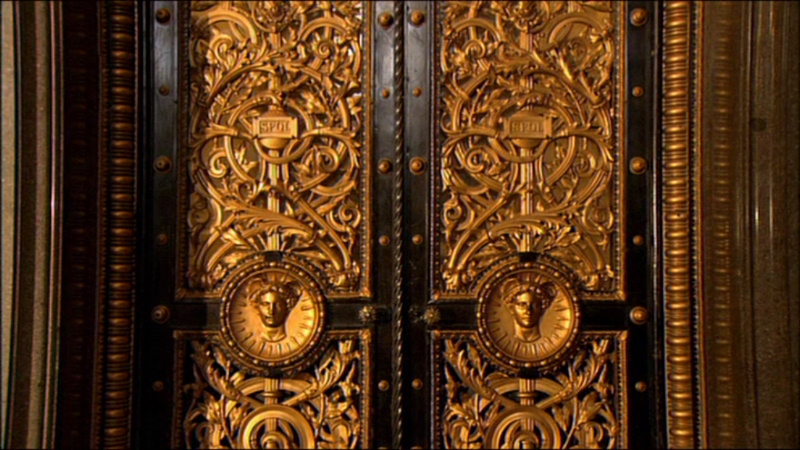 |
Screen Captures
(Strand - Region 0 - NTSC TOP vs. BFI - Region 2 - PAL BOTTOM)
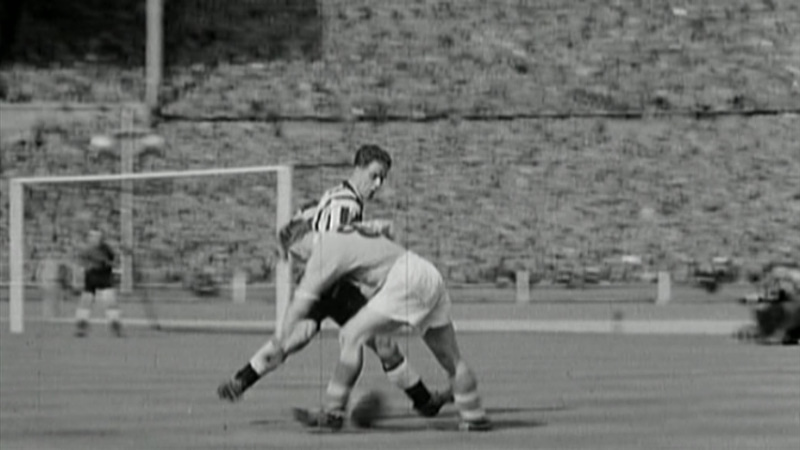 |
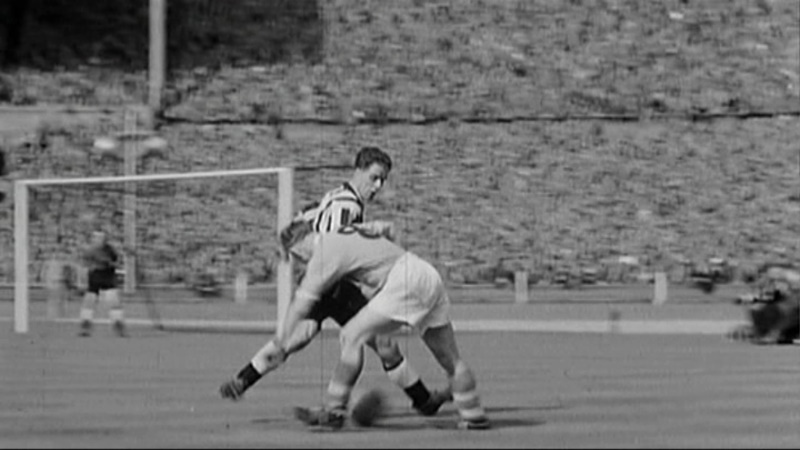 |
(Strand - Region 0 - NTSC TOP vs. BFI - Region 2 - PAL BOTTOM)
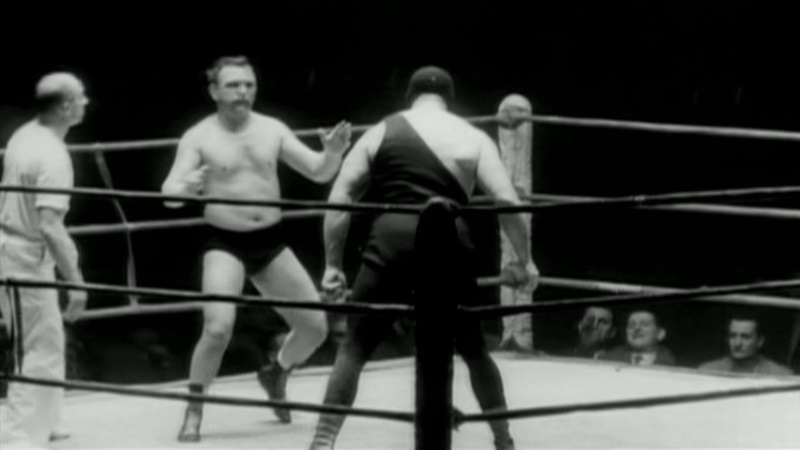 |
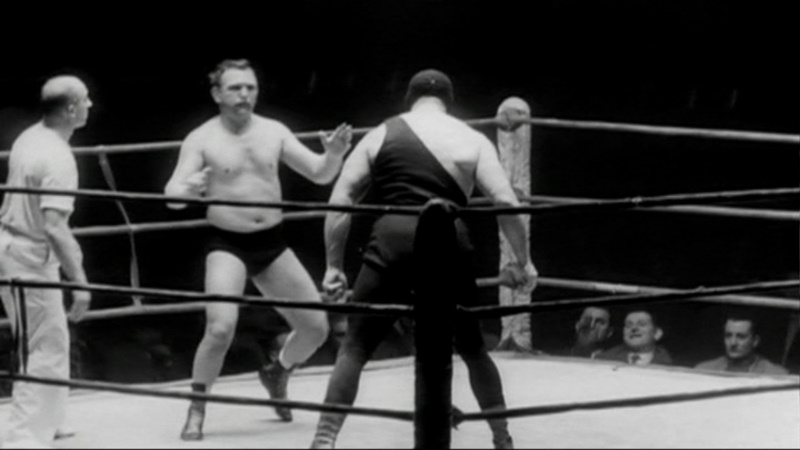 |
(Strand - Region 0 - NTSC TOP vs. BFI - Region 2 - PAL BOTTOM)
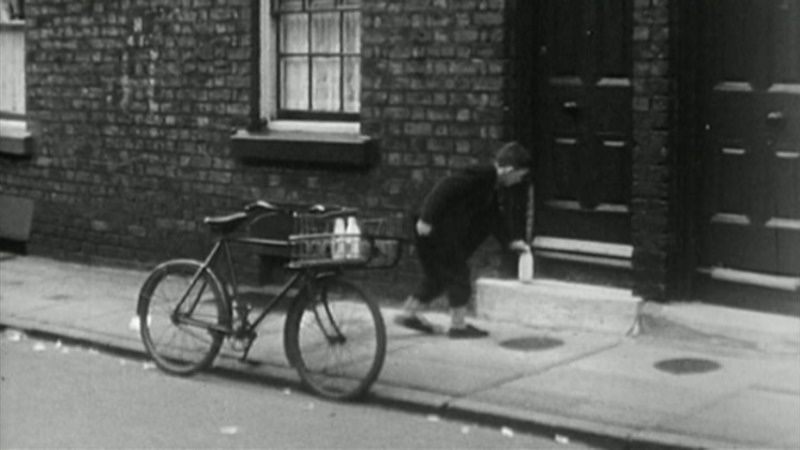 |
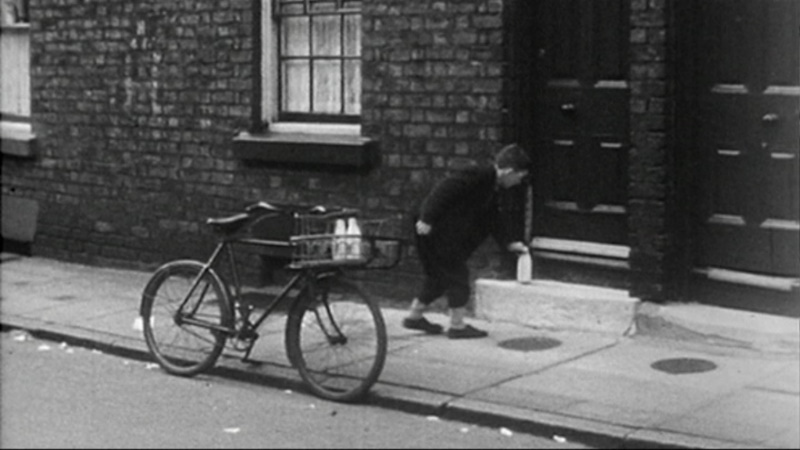 |
(Strand - Region 0 - NTSC TOP vs. BFI - Region 2 - PAL BOTTOM)
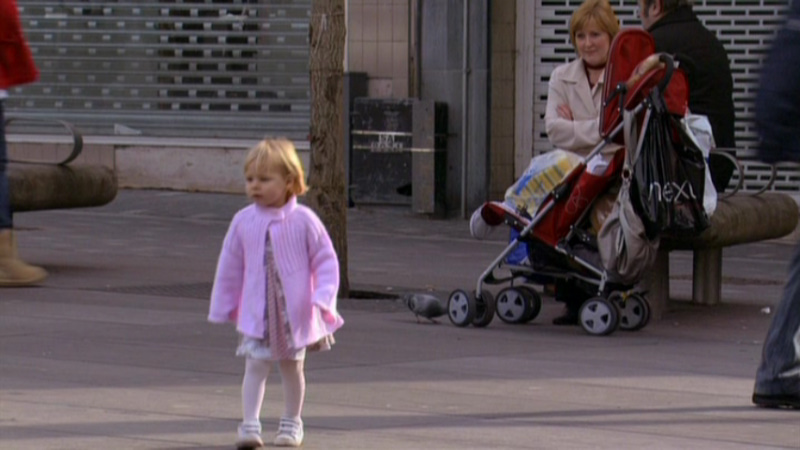 |
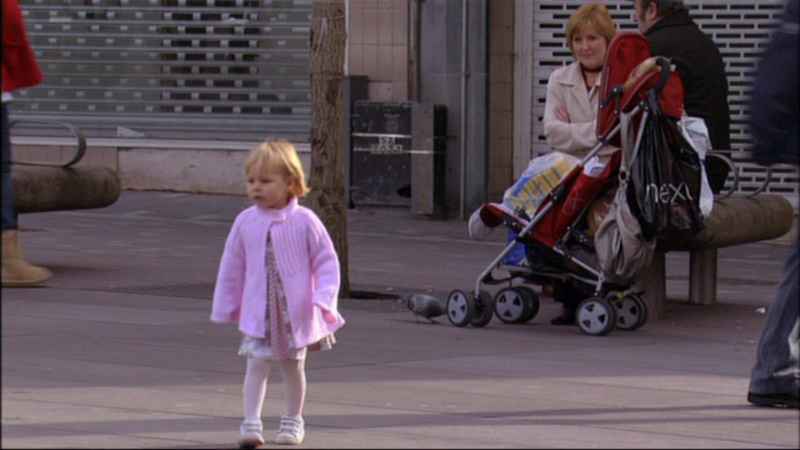 |
![]()
![]()

![]()
![]()
 Search DVDBeaver |
S E A R C H D V D B e a v e r |
